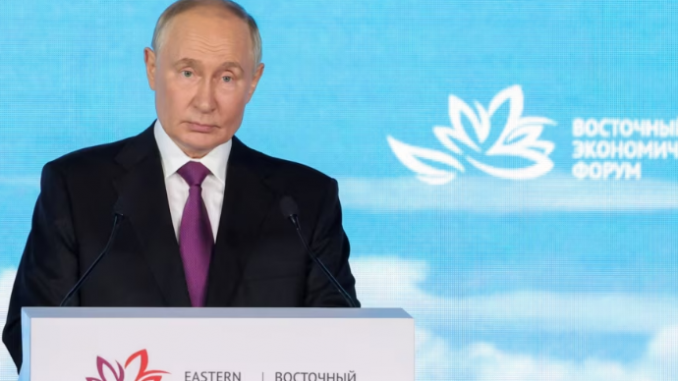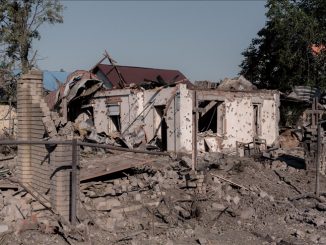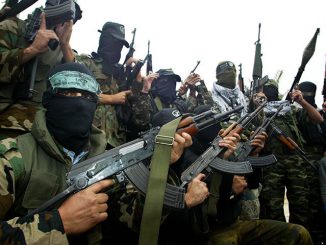
Russian President Vladimir Putin speaks at the Eastern Economic Forum in Vladivostok on September 5.
Published September 6, 2025
Russian President Vladimir Putin has warned that any foreign troops deployed in Ukraine would be considered “legitimate targets” by Moscow. This statement follows a recent summit in Alaska between Putin and U.S. President Donald Trump, which aimed to advance peace negotiations in the ongoing conflict. The warning comes as Russia launched 91 drone strikes overnight, targeting eight locations in Ukraine, though no casualties were reported.
President Volodymyr Zelenskyy has declined Putin’s suggestion to meet in Moscow, instead proposing Kyiv as the venue for negotiations. Zelenskyy has emphasized the importance of securing strong security guarantees from Western allies, particularly the United States, as part of any peace agreement. French President Emmanuel Macron announced that 26 countries have agreed to provide post-war security guarantees for Ukraine, with final decisions on U.S. support expected in the coming days.
The situation remains tense, with both sides holding firm positions. The international community continues to monitor developments closely, as the conflict’s resolution remains uncertain.
👥 Public/Political Reactions
🇺🇸 United States
President Trump has expressed a desire to broker peace, stating, “I think we’re going to get it all straightened out.” However, his administration’s approach has faced criticism. Some observers argue that his rhetoric may embolden Russia, as evidenced by Putin’s recent declaration that any Western troops in Ukraine would be considered “legitimate targets”
🇪🇺 European Union
European leaders have shown support for Ukraine’s sovereignty. French President Emmanuel Macron labeled Russia as the “aggressor” and emphasized the EU’s commitment to supporting Ukraine. Similarly, Estonian Prime Minister Kaja Kallas criticized Trump’s approach, suggesting that yielding to aggressors could set a dangerous precedent.
🇺🇦 Ukraine
In Ukraine, public opinion is divided. Some citizens view the U.S. involvement as a potential avenue for peace, while others are skeptical of Trump’s intentions. The Ukrainian government continues to advocate for strong security guarantees and a clear commitment from Western allies to deter further Russian aggression.
🌐 International Community
Global reactions vary. Countries like Finland and Estonia have reaffirmed their support for Ukraine, emphasizing the importance of upholding international law and sovereignty. In contrast, some nations express concern over the potential for appeasement, urging a more robust response to Russia’s actions.
 Resulting Effects
Resulting Effects
-
Heightened Tensions in Ukraine
-
Russia’s warning that any Western troops would be “legitimate targets” has increased the risk of military escalation.
-
Ukraine remains on alert, particularly along conflict zones where drone and missile strikes have intensified.
-
-
Diplomatic Polarization
-
Trump’s proposals for peace talks have drawn mixed reactions: some view it as a potential path to negotiation, while others fear it could embolden Russian aggression.
-
The U.S. political spectrum is divided, with critics warning that premature agreements could undermine long-term security.
-
-
Pressure on Western Allies
-
European nations, especially France, Germany, and the Baltic states, are under pressure to provide concrete post-war security guarantees to Ukraine.
-
Zelenskyy’s insistence on Kyiv-based talks reinforces the need for a coordinated, Western-backed approach.
-
-
Global Strategic Calculations
-
The potential involvement of a former U.S. president in diplomacy has complicated traditional foreign policy channels.
-
Russia may interpret these efforts as either an opportunity to negotiate favorable terms or as a threat, depending on the perceived unity of the Western coalition.
-
-
Uncertain Path to Peace
-
Despite public statements, no formal agreements have been reached.
-
The ongoing conflict, combined with international scrutiny, means any misstep could lead to renewed violence or stalled negotiations.
-
🔮 Future Outlook
-
Prolonged Negotiations Likely
-
With Zelenskyy insisting on strong Western security guarantees and Russia holding firm on its conditions, any peace agreement will likely take months, if not longer, to materialize.
-
Talks may require multiple international mediators to maintain credibility and prevent unilateral concessions.
-
-
Potential for Escalation
-
Russia’s continued drone strikes and warnings about Western forces suggest a risk of renewed military escalation if negotiations stall.
-
Ukraine may increase its defensive measures while seeking advanced weaponry from allies.
-
-
Western Unity Will Be Tested
-
EU and U.S. coordination on post-war security guarantees will be critical.
-
Any perceived disunity could embolden Russia to exploit diplomatic cracks, complicating peace efforts.
-
-
Role of External Influencers
-
Former leaders or non-traditional diplomats like Trump could shape public narratives, but their involvement may also introduce unpredictability into formal state negotiations.
-
International pressure—economic, political, and military—will continue to influence Russia’s calculations.
-
-
Long-Term Security Framework
-
If a peace deal is eventually reached, it may involve multi-nation guarantees, potentially including NATO members, aimed at deterring future aggression.
-
However, enforcement mechanisms and compliance will remain a major challenge.
-
-
Regional and Global Implications
-
Successful diplomacy could stabilize Eastern Europe and reduce refugee flows.
-
Conversely, failure could prolong conflict, disrupt global energy markets, and strain international relations.
-
 Bottom Line:
Bottom Line:
The ongoing Ukraine crisis underscores the importance of firm, principled diplomacy backed by credible security guarantees. While former President Trump’s involvement has stirred debate, the central takeaway is clear: peace cannot come at the expense of deterrence or sovereignty.
Ukraine’s insistence on Western-backed security measures is a prudent stance, reflecting lessons from history—appeasement only invites aggression. Strong, coordinated action from the U.S. and its allies remains critical to protecting Ukraine, preserving regional stability, and sending an unmistakable message to Moscow: any violation of international norms will carry serious consequences.
The road to peace is uncertain, but maintaining strategic resolve and supporting Ukraine’s sovereignty are indispensable for long-term security and the preservation of Western influence in global affairs.
SOURCES: RADIO FREE EUROPE – Russia Launches New Drone Strikes After Putin Warns Foreign Troops In Ukraine Will Be ‘Legitimate Targets’
LOS ANGELES TIMES – Putin says foreign troops deployed to Ukraine would be legitimate targets
REUTERS – Putin says any Western troops in Ukraine would be fair targets





Be the first to comment